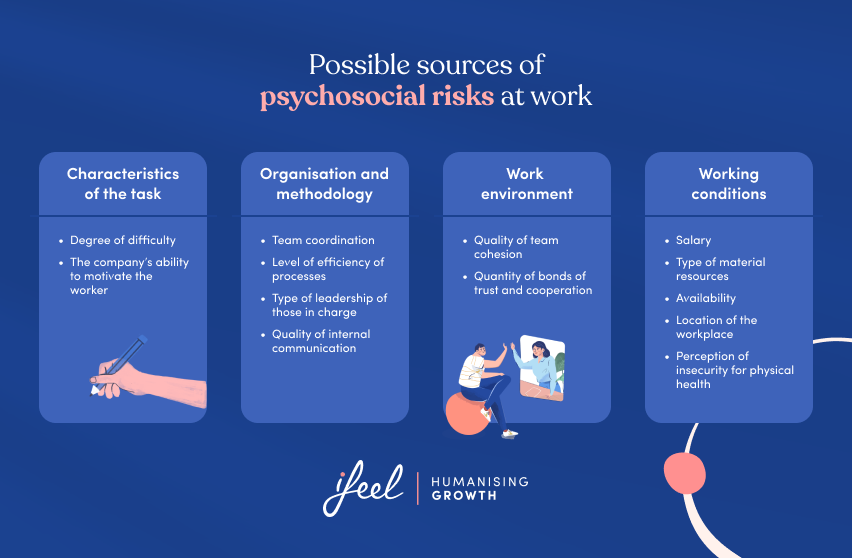When we talk about psychosocial risks at work, we have in mind the idea of measurable, assumable, and, above all, controllable risks so that they do not lead to real problems or, if they do, that they do not become serious mental health problems.
Specifically, what we measure, assume, and try to control is the negative impact that working conditions can have on people’s health, both physical and psychological.
Psychosocial risk factors
According to the Ministry of Labor, there are several psychosocial factors, which can be considered as work characteristics that influence the psychological well-being of employees, for better or worse. These factors include, for example, the workload and work pace, or the ability to develop professionally within the company.
When the company does not identify these factors and does not take appropriate preventive measures, employees may be subjected to varying degrees of risk in relation to these factors, which could potentially damage their mental health due to causes attributable to their work.
What causes psychosocial risks at work?
When working conditions have certain characteristics that merge with the employee’s vulnerabilities, it becomes difficult for them to adapt to these conditions. This is how the first negative mental health effects of work begin to appear. Of course, ideally, they should be prevented before they appear, but when this is not possible, they should be identified and dealt with as early as possible.
This is beneficial for individuals’ health but also the most efficient for the health of companies, which already have evidence that neglecting the psychological well-being of their employees has a negative impact on the organization’s medium- and long-term results.

Moreover, if the criterion of economic profitability is not enough for a company to decide whether to take measures to prevent psychosocial risks in the workplace, there is another reason that will be. Specifically, current legislation, which obliges companies to evaluate psychosocial risks and to implement measures for their prevention.
Some sources of psychosocial risks in the workplace

The sources of psychosocial risks at work can be diverse and come from different categories. Among them are the characteristics of the task, such as how dangerous or complex it is, its ability to motivate workers, etc.
In line with this, another category within which the sources of psychosocial risks can be found is the level of organisation of the team or the methodology used to work. Within this, the way in which the team is coordinated, the level of efficiency of the processes, the type of leadership of those in charge and the quality of internal communication stand out.
Of course, the working environment and the quality of relationships within the company can be sources of psychosocial risks if they are not adequate. For example, team cohesion may be lacking, or the team may lack bonds of trust and cooperation.
Finally, and in the most important category, are working conditions, such as salary, material resources, time availability, job location, and perceived insecurity of physical health. These variables can influence employees’ mental well-being.
Labor will sanction companies that fail to assess their employees’ psychosocial risks
According to what is known as Technical Criteria 104/2021 (in Spain), regarding the actions of the labor and social security inspection on psychosocial risks, which has been in place for several months, the Labor Inspectorate will check that companies comply with the obligation to identify and prevent psychosocial risks that may affect the psychological health of their workers.
The underlying philosophy is that psychosocial risks have to be addressed as any other occupational risk, so their impact must be assessed (including digitally) and prevented. Therefore, the Labor Inspectorate will supervise compliance, according to the particular characteristics of the different organizations.
What influences the psychosocial risk factors in a company?
The psychosocial factor in a company has a great influence, which is why it also has a major impact on mental health in the work environment. To understand this, let’s start from a basic understanding: an employee’s subjective experience (their psychological well-being experience) is the product of at least two interactions. The first is the individual and the group. The other is environmental and intrapsychic.
These interactions are dynamic, i.e. they involve a movement of changing and unavoidable tensions. However, they must maintain a certain balance: the diversions that occur must not exceed the individual’s coping resources or those of the organization. If the imbalance is too big, problems arise for the individual and the company. It is precisely these situations that any organization must learn to prevent and deal with if it does not want to jeopardize its performance.
We can consider the deterioration of an employee’s mental health as the deterioration of a person’s mental health due to factors applicable to their job. As mentioned above, it is the result of a disruption of different balances.
Faced with the appearance of disruptions in the psychosocial equilibrium, both the company and the worker will implement coping strategies. These strategies will be more or less adaptive for them, depending on the company’s corporate culture, the employee’s characteristics, and other circumstances.
The question is, where will the responsibilities be more heavily loaded and what will be the final result of this excessive imbalance in the dialogue between the individual, the environment, and the group?
These breakdowns are often preventable, and it is often more economically efficient to try to anticipate them than to deal with them when they have already occurred.
Of course, prevention is an essential strategy from the point of view of human values and company profitability. To implement it, it is necessary to take into account a coherent and transversal psychosocial approach at different levels: individual, relational, group, and organizational.

Psychosocial risks in a company that need to be taken into account
Let’s take a look a look at some of the psychosocial risks that influence employee’s health and therefore, the company’s overall health:
| Risk | What does it consist of? |
| One-to-one relationships | Interaction creates collaboration and complicity. It also leads to hostility, tension, and rivalries. Ignoring this obvious reality is a psychosocial risk factor in the company when it comes to looking after workers’ mental well-being. |
| Management of hierarchical relationships | It is about managing relationships at different levels: with peers, with superiors, and with subordinates. It is not the same to have a manager who does not make serious mistakes when leading the team as it is to have an authoritarian and inaccessible boss. Nor is that the same as suffering a power vacuum that leaves the team adrift and generates a lack of control and insecurity. |
| Group dynamics | Depending on team composition, leader’s or manager’s personal charisma, and the dominant corporate culture of the company, there will be relationships of mutual admiration-inspiration fostered by collaboration. There may also be toxic competitive dynamics, peer pressure, and non-inclusive or predatory attitudes. |
| Sense of belonging and identity | Work is work, and it is unnecessary to romanticise it as if it dominates our whole life or as if we were to inherit the company ourselves. However, managing the psychosocial factor in the company implies that it is unrealistic to pretend that talent can be retained if the employee is not committed to the company’s mission. In other words, if they do not identify with it and do not feel an active part of the organisation. |
| Environmental aspects | Care must be taken concerning physical space, lighting, furniture and room layout, ergonomics, materials, and physical safety perceived by workers… These and other purely environmental aspects influence, for better or worse, the relationships, performance, and comfort of the workforce. |
Strategic support for mental health in a company
Employee experience is very subjective and therefore very relative. However, as a company, we cannot selfishly cling on to this relativity to ignore the influence we have on the psychological well-being of our employees and the benefits of psychological therapy on them.
Far from it, there are at least three strategic guidelines that we can draw to increase the productivity of the company thanks to the support of psychological well-being (even in the digital environment) of the employees and not at their expense.
1. Take responsibility for staff’s health
It is a matter of deciding what level of responsibility the company is going to take in supporting the psychological well-being of its employees, taking into account two things: its company culture and the measurable effects that the fostering of mental health or its deterioration can have on the company’s performance.
In terms of the company-employee relationship, it is necessary to decide how much care the company wants to put into its relationship with its employees: how much it will get involved, how it will demonstrate to its talent that it is interested in retaining them.
2. Create a strategy to boost psychological health
Next, you need to design a strategy that includes preventing and addressing potential mental health problems in employees. This will have to take into account psychosocial risk factors and protective factors that can be considered as resources.
Of course, this strategy must be explicitly implemented into the company’s corporate culture, ensuring a balance between the two.
3. Applying decisions taken regarding occupational health
Once certain decisions have been made, the consistent thing to do is to implement and evaluate this strategy on an ongoing basis, mobilizing the necessary resources to do so.
For example, external advice to managers and HR managers by qualified psychologists on how to protect employees’ mental health in that particular company, and the availability of therapeutic tools at different levels as part of social benefits or emotional salary.
How can we prevent psychosocial risks?
Ultimately, trying to control psychosocial risks at work is about taking care, as much as possible, of a worker’s conception of themselves as a member of the company. Specifically, to enhance their subjective experience of being part of it: how they perceive each of the characteristics of their work.
To achieve this, it is essential to design a realistic but ambitious strategy, aimed at making decisions on prevention and addressing the mental health problems that work can generate in the employee. This strategy must be the result of a corporate culture that includes caring for the psychological health of employees among its main values. In addition, it should transversally cover the entire journey of the employee as an internal customer of the company, from the selection process to the exit interview.
No company is perfect, just as no job or employee is perfect. However, that is no excuse for companies not to take responsibility for preventing psychosocial risk factors that can affect their employees using all the tools at their disposal.
One of them is to count on the help of those who know the most about this matter: psychologists.

Ifeel has created an emotional well-being program for companies, designed by its team of leading psychologists with the aim of helping companies place the care of their employees’ psychological health at the heart of their corporate culture.
Thanks to this partnership, organizations will have the necessary tools to identify and prevent the main psychosocial risk factors that may affect them.
In addition, HR managers can receive personalized, data-driven advice on how to get the most out of the teams in their charge without putting their physical and psychological health at risk, bearing in mind that the prevention of psychosocial risks is a crucial tool for sustainable productivity.
Moreover, ifeel’s emotional well-being program for companies offers employees a mental health care service structured at different levels depending on their needs at any given time. This way, they can access various mental health care tools with ifeel’s app. On a second level, they can receive emotional support through a chat with one of our platform’s licensed psychologists. If continuous support is needed over time, they only have to access the third level of the program: online psychological therapy with a psychologist specialized in cases such as theirs.
We hope you found this post about psychosocial risks at work interesting. If you would like more information about our emotional well-being program for companies, simply request it and we will contact your team as soon as possible.










